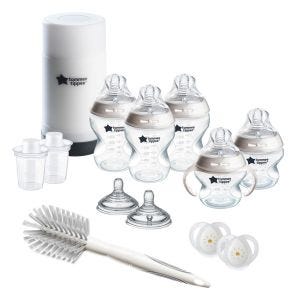
This is a demo store. No orders will be fulfilled.
Subscription orders can be cancelled at anytime. Free delivery on all subsequent subscription orders. Find out more about subscriptions.
They’re easy and fuss free
Your products are automatically sent to you
You save up to 10% when you sign up for a subscription
You can cancel at any time
Natalie, UK
"When I first became pregnant, I thought I would manage it all just fine. After all, I had experience with babies through my job, my friends, and my family. I expected that I would be absolutely fine because everyone else I had seen or heard of being pregnant were absolutely fine.
I thought I would be able to continue doing everything I had before I got pregnant, working, socialising, and enjoying my hobbies. This was not the case at all. As soon as I got to 12 weeks the dreaded morning sickness started and I struggled to have the energy to do anything. I felt disheartened and angry at myself.
Why wasn't I enjoying every moment of pregnancy? Why didn't I look like the pregnant women I saw on TV? Why wasn't I shouting from the rooftops that I was expecting a baby?
I had waited for this moment since I was a little girl, and although my journey to motherhood started much earlier than I imagined, it was always my dream to be a mum. I started questioning every little detail and thought that I had, and comparing myself constantly to other pregnant women on social media. I started to obsess over my pregnancy journey and mine and my baby's wellbeing. I started to dislike myself.
No one had spoken to me about changes in your mental health during pregnancy. I was used to hearing pregnancy being spoken about as a completely joyful experience. I had never heard of perinatal illness and had no clue that being pregnant could affect your mental health in this way. It made me feel alone, as though I was the only one who was not enjoying every minute of my growing bump. The truth is, I wasn't alone. There are millions of women who feel exactly like I did during pregnancy.
Once my son was born, I found support through my amazing health visitor. Postnatally, I had become obsessed with my son's health. I had constant worries and fears about his safety and wellbeing. At night I would set an alarm to go off every 30 minutes so I could check that he was breathing. I stopped leaving the house as had constant intrusive thoughts that the pram would fall over. During one visit with my health visitor, she noticed that my behaviour was erratic and spoke privately with my husband. She advised him to take me to the GP. Although I was displaying the symptoms of perinatal OCD, the doctor didn't recognise this, and I was told I was depressed.
It was through support from my family and friends that I got better. They all came together to put a plan in place to help me. Someone visited me every day, encouraging me to leave the house and challenge my intrusive thoughts, and after a few months, I started to feel myself again.
During my second pregnancy, the symptoms came back and became debilitating. This time, my family and I were more aware of perinatal mental illness and knew to ask for help. I was finally diagnosed with perinatal OCD and supported through the specialist perinatal mental health service. The diagnosis allowed my family, friends and most importantly, myself, to understand what I was struggling with. I was able to access Cognitive Behaviour Therapy, which was the right support for me and helped enormously.
To anyone else who is pregnant and struggling with intrusive thoughts and worries, I would say you are not your thoughts, and you can overcome OCD. Please talk to those around you about how you're feeling. Speak to your midwife, your health visitor or anyone you trust. With the right support and care from those around you, you can get better."
If this content reminds you of your own experiences or makes you think of someone you know and you feel concerned or uncomfortable, please head to the PSI website for information about perinatal mental health resources that may be able to help.